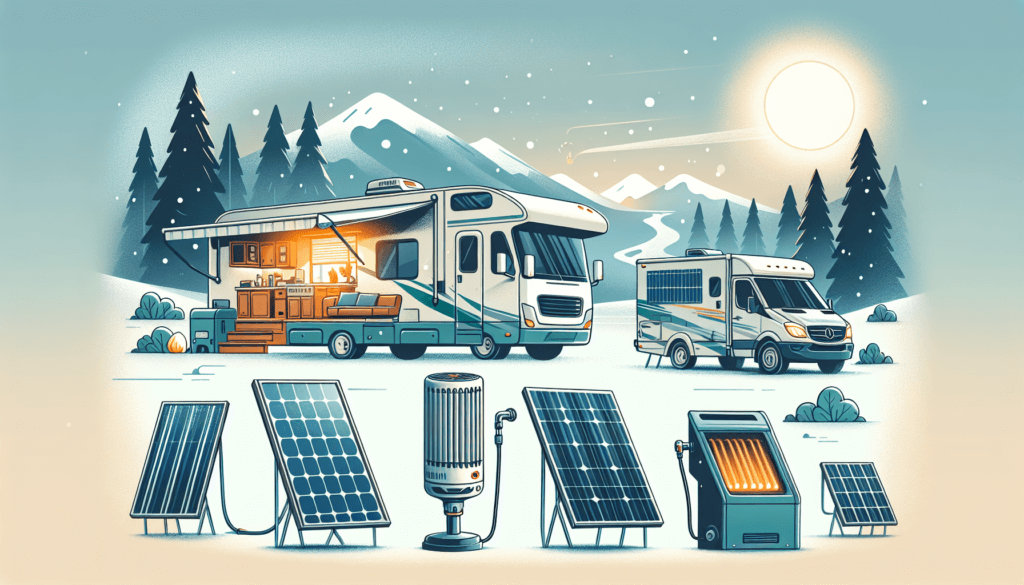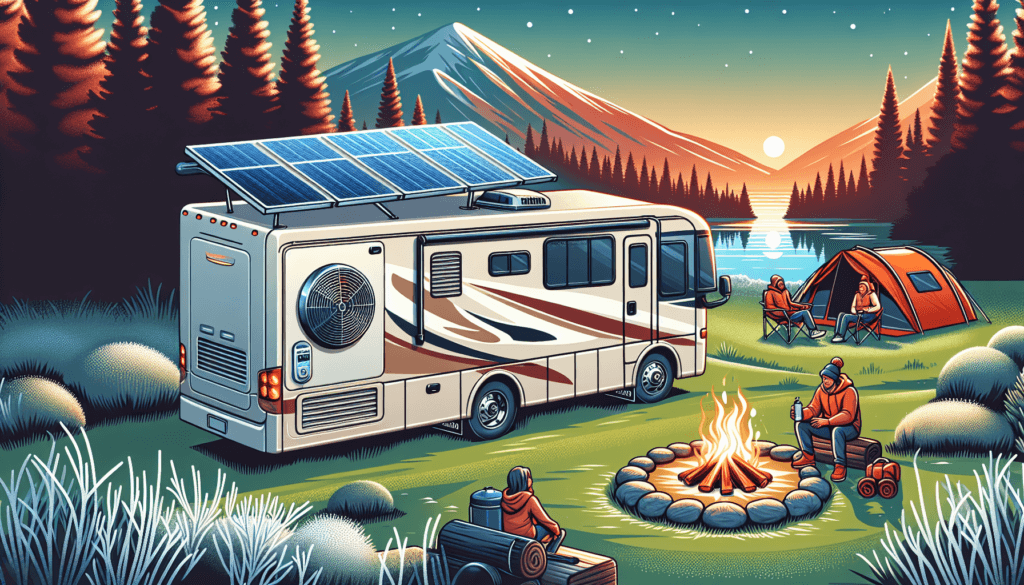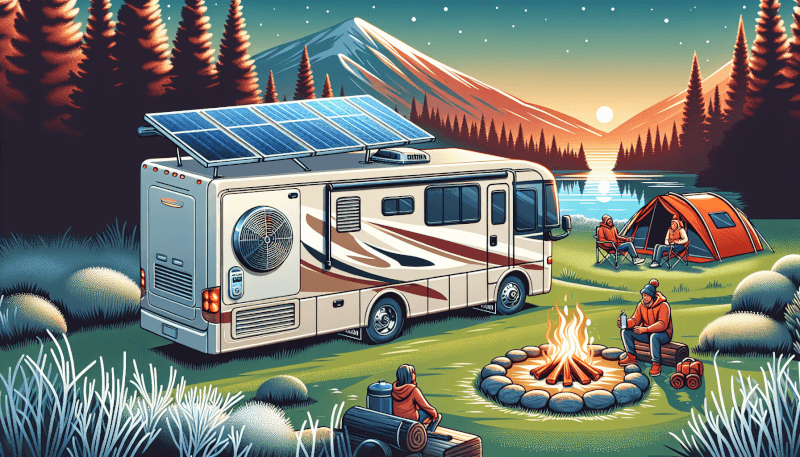Imagine going on a camping trip in your trusty RV, surrounded by stunning snowy landscapes. The only problem? The freezing temperatures make it almost impossible to stay warm inside your cozy mobile home. Luckily, there’s a solution – the RV Camping Solar Heater. This innovative device harnesses the power of the sun to keep you toasty warm, even in the coldest of weather. Say goodbye to chilly nights and hello to a comfortable, cozy camping experience.

Understanding RV Camping Solar Heaters
What is an RV camping solar heater?
An RV camping solar heater, also known as a solar water heater or solar thermal system, is a device that utilizes the sun’s energy to heat water for various uses in an RV. Instead of relying solely on electricity or propane to heat water, these solar heaters harness the power of the sun to provide a sustainable and cost-effective heating solution.
How does an RV camping solar heater work?
RV camping solar heaters consist of solar panels, a water storage tank, a heat exchanger, and a circulation system. The solar panels, typically mounted on the roof of the RV, collect sunlight and convert it into heat energy. This energy is then transferred to the water storage tank through the heat exchanger. The heated water is then circulated throughout the RV’s plumbing system, providing hot water for showers, sinks, and other appliances.
Choosing the Right RV Camping Solar Heater
Considerations for selecting the right RV camping solar heater
When choosing an RV camping solar heater, several factors need to be taken into consideration. Firstly, consider the size and capacity of the solar heater. This will depend on the number of people in your RV and the amount of hot water required. Secondly, consider the weather conditions of your camping destinations. If you frequently camp in areas with limited sunlight, you may need a solar heater with additional features such as a backup heating system. Additionally, consider your budget, as solar heaters come in a range of prices and features.
Types of RV camping solar heaters
There are two main types of RV camping solar heaters: active solar heaters and passive solar heaters. Active solar heaters use pumps or fans to circulate water or air through the system, while passive solar heaters rely on natural convection to move the heated water or air. Active solar heaters are generally more efficient and suitable for larger RVs, while passive solar heaters are simpler and require less maintenance.
Factors to consider when choosing an RV camping solar heater
Apart from the type and size of the solar heater, there are a few other factors that should be considered. These include the ease of installation, the durability of the system, and the availability of replacement parts. It is also important to check whether the solar heater is compatible with your RV’s plumbing system and if any modifications or additional equipment are required for installation.

Installation and Setup of RV Camping Solar Heater
Preparing your RV for solar heating
Before installing an RV camping solar heater, it is important to ensure that your RV is prepared for solar heating. Start by inspecting the roof of your RV to check for any potential obstructions or damage. Clear any debris or objects that might block the sunlight from reaching the solar panels. Additionally, check the condition of your RV’s plumbing system to ensure that it can handle the installation of a solar heater.
Location considerations for installing the solar heater
The location of the solar heater on your RV’s roof is crucial for maximizing solar energy absorption. Ideally, the solar panels should be placed in an area that receives direct sunlight for the majority of the day. Avoid shading from trees or other structures that could obstruct sunlight. Additionally, consider the weight and size of the solar heater and ensure that it is safely mounted to the roof to avoid any damage or accidents while driving.
Installation steps for an RV camping solar heater
The installation process of an RV camping solar heater may vary depending on the specific brand and model. However, there are some general steps to follow. Firstly, mount the solar panels securely on the roof of your RV using appropriate brackets or mounting hardware. Connect the solar panels to the water storage tank using the provided tubing and fittings. Next, install the circulation system and connect it to the plumbing system in your RV. Finally, test the system to ensure that it is functioning properly.
Additional equipment required for installation
In addition to the solar heater itself, there may be some additional equipment required for installation. This can include mounting brackets or hardware, tubing, fittings, and connectors. It is important to carefully read the manufacturer’s instructions and ensure that you have all the necessary equipment before starting the installation process.
Optimizing Solar Heating Efficiency
Understanding solar heating efficiency
Solar heating efficiency refers to how effectively a solar heater converts sunlight into usable heat energy. Higher efficiency means a larger percentage of the sun’s energy is converted into hot water, resulting in lower energy costs and a more sustainable heating solution. Factors that can affect solar heating efficiency include the quality and design of the solar panels, the insulation of the water storage tank, and the circulation system’s effectiveness in transferring heat.
Tips for maximizing solar heating effectiveness
To maximize the effectiveness of your RV camping solar heater, there are several tips to keep in mind. Firstly, ensure that the solar panels are clean and free from any dirt or debris that could obstruct sunlight. Regularly inspect and clean the panels to maintain optimal performance. Secondly, adjust the angle and orientation of the solar panels to optimize sunlight absorption throughout the day. This may require some experimentation, but finding the optimal position will greatly enhance heating efficiency. Lastly, consider using a solar heating controller or timer to regulate the system and ensure it is only operating when needed.
Monitoring and adjusting the solar heater
Regular monitoring and adjustment of the solar heater are essential for maintaining its efficiency. Monitor the temperature of the water in the storage tank to ensure it is reaching the desired level. If the temperature is consistently too low, adjustments may need to be made to the positioning of the solar panels or the operation of the circulation system. Additionally, monitor the system’s performance and check for any leaks or malfunctions that may require maintenance or repair.

Winterizing Your RV for Cold Weather
Preparing your RV for winter camping
When preparing your RV for winter camping, it is important to take certain precautions to ensure comfort and safety. Start by insulating the windows and doors of your RV to prevent cold drafts. This can be done using weatherstripping or thermal curtains. Additionally, insulate the floors and walls of your RV with foam or fiberglass insulation to retain warmth. Consider using skirting or thermal blankets to further insulate the underside of your RV.
Insulating your RV to retain warmth
Insulation is key to retaining warmth in your RV during cold weather. Besides insulating the windows, doors, floors, and walls, there are other areas that should be addressed. Insulate any exposed pipes or water lines to prevent freezing. Use pipe insulation or heat tape to keep the water flowing smoothly. Additionally, insulate the area around your water storage tank to prevent heat loss. Consider using insulation blankets or foam boards to create a barrier.
Using additional heating methods in conjunction with the solar heater
While an RV camping solar heater can provide a significant amount of heat during winter camping, it may be necessary to use additional heating methods to ensure comfort. Electric or propane heaters can be used as supplemental sources of heat, especially during extremely cold weather or when the solar heater is not able to provide sufficient warmth. It is important to ensure that any additional heating methods are used safely and are compatible with the electrical or propane systems in your RV.
Safety Considerations When Using RV Camping Solar Heaters
Understanding potential safety hazards
While RV camping solar heaters are generally safe, there are a few safety hazards that should be considered. Firstly, be cautious when installing the solar panels on the roof of your RV, as working at heights can be dangerous. Use appropriate safety equipment and follow all recommended safety procedures. Secondly, be mindful of the temperature of the water in the storage tank, as it can become extremely hot. Take precautions to avoid scalding, such as using thermostatic mixing valves or setting the water temperature to a safe level.
Safety tips for operating an RV camping solar heater
To ensure safe operation of your RV camping solar heater, consider the following tips. Firstly, regularly inspect the system for any signs of damage, wear, or leaks. If any issues are identified, address them promptly. Secondly, familiarize yourself with the manufacturer’s instructions and guidelines for safe operation. This includes understanding any temperature limits, maintenance requirements, and safety precautions specific to your solar heater model. Lastly, use caution when working around the solar panels or any electrical components, and seek professional assistance if needed.

Maintenance and Care of RV Camping Solar Heaters
Regular cleaning and inspection
Regular cleaning and inspection of your RV camping solar heater are essential for maintaining its performance and longevity. Clean the solar panels periodically to remove any dirt, dust, or debris that may accumulate. Inspect the panels for any signs of damage, such as cracks or loose connections. Additionally, inspect the water storage tank, circulation system, and any other components of the solar heater for leaks, corrosion, or wear. Address any maintenance or repair needs promptly to prevent further damage.
Troubleshooting common issues
While RV camping solar heaters are generally reliable, there may be some common issues that can arise. If you experience a decrease in heating efficiency or a decrease in hot water supply, check the solar panels for any obstructions or damage. Ensure that the circulation system is functioning properly and that there are no leaks or blockages. If you are unable to troubleshoot the issue, refer to the manufacturer’s troubleshooting guide or contact a professional for assistance.
Replacing parts and components
Over time, certain parts and components of your RV camping solar heater may need to be replaced. This can include solar panels, the water storage tank, circulation pumps, or temperature sensors. When replacing parts, ensure that they are compatible with your specific solar heater model and meet the manufacturer’s specifications. Follow the manufacturer’s instructions for proper installation and consider seeking professional assistance if needed.
Alternative Heating Options for RV Camping
Propane heaters
Propane heaters are commonly used in RV camping as an alternative or supplemental heating option. They utilize propane fuel to produce heat, which is distributed through vents or radiators. Propane heaters are known for their efficiency and ability to quickly heat up a space. However, they require a propane supply and should be used with caution due to the potential for carbon monoxide emissions. Proper ventilation is crucial when using propane heaters in an enclosed space like an RV.
Electric heaters
Electric heaters are another popular choice for RV camping heating. They use electricity to generate heat, which is then distributed through radiant heat or forced air. Electric heaters offer convenience and versatility, as they can be easily plugged into a power source. They come in various sizes and designs, including portable options for smaller RVs. However, electric heaters can put a strain on the RV’s electrical system, and care should be taken to prevent overload or tripping of circuit breakers.
Wood-burning stoves
For those who enjoy a more rustic camping experience, wood-burning stoves can provide both warmth and ambiance. These stoves burn wood to generate heat, which is radiated throughout the RV. Wood-burning stoves require a chimney or venting system for proper ventilation and should be operated with caution to prevent fire hazards. Additionally, they require a supply of firewood, which may not be readily available in all camping locations.

Benefits of RV Camping Solar Heaters
Reduced reliance on non-renewable energy sources
One of the key benefits of RV camping solar heaters is the reduced reliance on non-renewable energy sources. By utilizing the sun’s energy to heat water, the need for electricity or propane is minimized. This not only helps to conserve natural resources but also reduces carbon emissions and environmental impact. RV camping solar heaters provide a sustainable heating solution that aligns with the principles of eco-friendly camping.
Eco-friendly solution
RV camping solar heaters are an eco-friendly solution for heating water while camping. Solar energy is a renewable resource that does not contribute to air or water pollution. By harnessing the power of the sun, RV campers can enjoy hot water without relying on fossil fuels or grid electricity, contributing to a cleaner and greener environment.
Cost savings in the long run
While the initial investment for an RV camping solar heater may be higher compared to traditional heating methods, the long-term cost savings can be significant. By eliminating or reducing the need for electricity or propane, RV campers can save on energy costs in the long run. Additionally, solar heaters require minimal maintenance and have a longer lifespan compared to other heating options, further reducing expenses over time.
Conclusion
RV camping solar heaters provide a sustainable and cost-effective solution for heating water while enjoying outdoor adventures. Understanding how these solar heaters work and selecting the right one for your RV is crucial for optimal performance. Proper installation, maintenance, and care will ensure that your RV camping solar heater continues to provide warmth and comfort during chilly weather. By harnessing the power of the sun, you can reduce your reliance on non-renewable energy sources, minimize environmental impact, and save money in the long run. So, gear up your RV with a solar heater and embark on your next camping trip with confidence and eco-consciousness!


